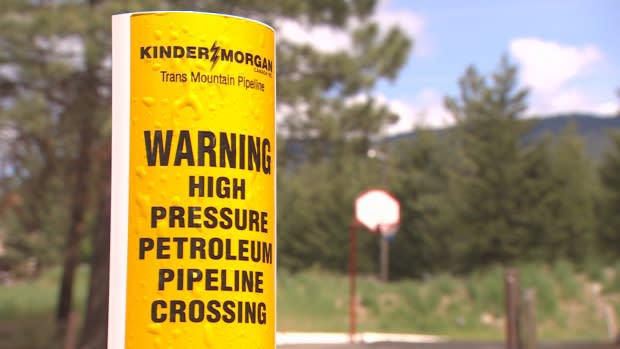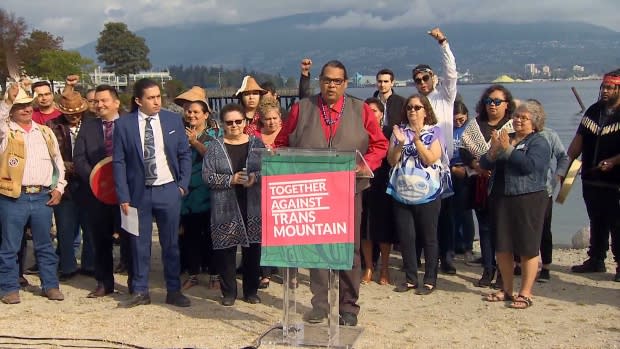Trans Mountain consultation approach 'fatally flawed' even with extension, says First Nations leader
Even if the time period for consultation with Indigenous groups over the expansion of the Trans Mountain pipeline is extended by a few weeks, "it still doesn't make up for the approach and the flawed way the consultations are being done," says one B.C. First Nations leader.
Kukpi7 Judy Wilson, elected leader of the Neskonlith band and a member of the executive branch of the Union of B.C. Indian Chiefs, sent a letter to Prime Minister Justin Trudeau earlier this week in which she described the consultation process as "fatally flawed" and detailed several critiques of the process that's currently underway.
Amarjeet Sohi, Minister of Natural Resources, announced Thursday the consultation timeframe would be extended by a month, based on requests from Indigenous groups and advice from former Supreme Court of Canada justice Frank Iacobucci who is leading the government's efforts on consultation for the proposed expansion.
"Extending the timeline doesn't address all these issues and approach to consultation," said Wilson.
Among her criticisms is that Canada is in a "clear conflict-of-interest" when it comes to fulfilling its obligations to Indigenous groups, especially since it purchased the project from Kinder Morgan.
"As pipeline owners, they have a constant bias now because they're looking at the interest of the pipeline as a national interest versus their Crown role for consultation to our Indigenous Peoples," said Wilson in an interview Thursday.
She is also critical of the consultation process itself, because "it's still bypassing our proper title holders, who are our people … they're relying mainly on the band construct, which the federal government created," she said.
Wilson is referring to the traditional territory of her nation, and other First Nations, which extends far beyond the boundaries of the reserves.
"We didn't cede, you know, sell, our land. We didn't relinquish our land. So we hold underlying title," she said.
Consultation triggered by appeal court decision
The consultation process currently underway is the result of a Federal Court of Appeal decision in August 2018 that resulted in the expansion's approval being rescinded.
This happened in part, because the court found the federal government didn't adequately meet its constitutional duty to consult with Indigenous groups whose rights and territories stand to be impacted by the expansion.
Specifically, the court took issue with the last stage of the government's consultation process.
"Canada's efforts fell well short of the mark set by the Supreme Court of Canada," stated the ruling.
"Canada acknowledged it owed a duty of deep consultation to each Indigenous applicant. More was required of Canada."

In an emailed statement, the federal government said "Our government is renewing Canada's relationship with Indigenous Peoples, creating one based on the recognition of rights, respect, co-operation, and partnership."
The statement acknowledged there are diverse opinions about the pipeline and that the government consultation team, comprised of about 60 people, has been working since December to work meaningfully with individual communities.
It also said the consultation team has a mandate to "offer responsive accommodations where appropriate."
'It's not a good investment'
Rueben George, a spokesperson for the Tsleil-Waututh Nation on the pipeline, said he's skeptical about the government's extension to engage in further consultation but he's still hopeful the government will look at all the research his nation has done into the risks associated with the project including a 1,200 page assessment.
"If it's fair, I'm confident that they would agree with us that it's not a good investment, it's not a good project and it's too much risk," he said.

"The best thing we can do is prepare ourselves and we're more than ready for anything. We're more than ready to sit down and try to come to an agreement that this is not a good project."
George said he understands the pipeline could bring financial benefits to some communities but that for his community and other First Nations that are opposed to the pipeline, no amount of money is worth risking the reciprocal relationship between his people and the lands and waters.
Buying in
Much like the difference of opinion over the pipeline from city to city, or province to province, Indigenous groups have taken varying positions on the pipeline expansion with some in support and others in opposition.
Several Indigenous groups continue to express an interest in purchasing a stake of the pipeline from Ottawa.
Stephen Buffalo is the president and CEO of the Indian Resource Council based in Alberta. The group was started in the late 1980s by "chiefs representing the oil and gas producing First Nations," according to the organization's website. The council has a membership of 134 First Nations with oil and gas resources on their land.
The group is one of many that's expressed an interest in buying a stake in the pipeline and has been in contact with Finance Minister Bill Morneau about how that might happen.

Buffalo said after the latest meeting with Morneau there's a lot of uncertainty over what the federal government plans to do — but they're still going to work on putting together a proposal for Ottawa.
"The money's going somewhere and I think it should rightfully go to the First Nations people who have been, for many many years, over 150 years, been in poverty," he said.
"We're not trying to be pipeline owners…. We need a source of revenue other than what government controls."
Buffalo said it has been "tremendously difficult" being in a position where people have perceived him to be in direct conflict with First Nations who stand in opposition to the project.
"To be honest, I'm proud of the fact that they've taken this big company and the federal government and stopped them in their tracks in this development of the TMX because it's recognition of our Indigenous rights. But now, what's next?"
He said he's not trying to tell other nations what position to take in their territories and that he doesn't want First Nations to be in conflict with one another over the project.

